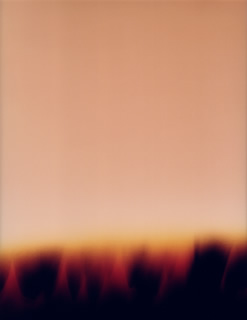FROM EYE OF THE HOLOCAUST
BOXCAR
Assaulted by brick and steel, my sister and I cross
the glass bridge between then and now, touch
Szumsk, the Polish town
our grandparents came from, walk into
Ejszyszki Tower eyeing photo doppelgängers
of relatives we call the monkey aunts,
of an uncle who couldn't skate the '36 Olympics,
of our parents, ourselves.
My younger sister has married a Baptist, raised
children who don't believe they are Jews;
yet she — riveted — is moving snail's-pace.
So when I come upon it, I am alone.
It's an old red cattle car like those from
our Missouri childhood, counted as they
clacked by full of livestock
due for slaughter. But this one is different.
To avoid passing through, I pretend
to examine oxidized razors, forks,
tea strainers, then metal instruments
of torture which up-close
become umbrella frames. I check my watch,
consider flight...
yet as I turn, I see my sister
by the boxcar unwilling to enter. Why are
we here? Hurrying toward her, I move past
cart, suitcases, hat boxes. What will it tell us?
For a moment, we are side by side, aware of
primal, physical comfort. Then together
we step in. It is dark. We do not speak.
After 50 years, stench still saturates
the boards. As I inhale it, I feel fingers
tug at edges of my skirt,
my sweater, my hands. Small, sweaty heads
I can't see butt me, begging for refuge,
those who would not have been spared:
my children, my sister's Mischling children,
my own Mischling grandchildren.
Suddenly, a soprano voice echoes around us.
Choo-choo. Turning, we see a boy-child
havened between his parents.
He smiles, nods sweetly, beckoning to us and to
the invisible hordes pressed close. Choo-choo,
he repeats. Choo-choo. All aboard...
EINSTEIN'S DAUGHTER
In 1914, steeped in Brownian motion,
photoelectrics,
the marked irregularity
of Mercury's orbit around the sun,
Einstein wrote his wife Mileva,
mother of his sons, asking her to:
(1) keep his linen in order,
(2) serve him 3 meals a day in his room,
(3) address him only when required.
When he met Mileva, an ethnic Serb,
she was a physics student, too,
and he called her his dollie
who made his pillow catch fire.
Their love-child Lieserl —
given away the year
before they married — vanished.
But what was she like?
Did she hear music of spheres?
Or did she tend meals and linen,
board a Dachau train with
her children knowing only that
relativity is what happens to you?
EYE OF THE HOLOCAUST, Susan Terris (Arctos Press, 1999)
Photo: © Diane Rosemblum Althoff

